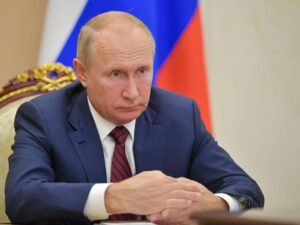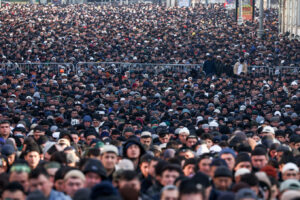
The participation of President Vladimir Putin in the collective Iftar prayer during the celebration of Eid al-Fitr at City Square in Moscow marks a significant moment in Russian society. This event, commemorating the end of Ramadan, highlights the increasing recognition of the Muslim community within Russia, long ago Muslims practiced faith secretly. The essay will explore the implications of this event, the historical context of Islam in Russia, the contributions of influential individuals, and potential future developments in interfaith relations and government policies.
Eid al-Fitr is an essential celebration in the Islamic calendar. It signifies the end of Ramadan, a month of fasting, prayer, and reflection for Muslims worldwide. The gathering at the Red Square, a site of historical significance, represents not only a religious occasion but also a political statement. President Putin’s attendance reflects a broader strategy of fostering unity among Russia’s diverse religious groups. The significance of this gesture lies in acknowledging the contribution of the Muslim community to Russian society.
Historically, Islam has been present in Russia for over a thousand years. The Volga Bulgars were among the first groups to adopt Islam in the 10th century. Over the centuries, various ethnic and cultural groups, such as the Tatars and Chechens, have enriched the tapestry of Islam in Russia. The 20th century saw a considerable transformation in the relationship between the state and religious bodies. After the fall of the Soviet Union, the government began to adopt a more inclusive approach towards various religions to promote national unity.
Observing recent trends in Russian politics reveals a deliberate effort by the government to embrace the Muslim community. Events such as the Eid al-Fitr celebration at Red Square send a message of coexistence and mutual respect. This effort is exemplified by the appointment of Ramzan Kadyrov as President of Chechnya, who actively promotes Islamic values while maintaining loyalty to the federal government. His influence has been pivotal in fostering ties between the government and the Muslim populace in Chechnya and beyond.
Additionally, prominent figures like Sheikh Ravil Gainutdin, the head of the Russian Muftis Council, have played a crucial role in bridging the gap between religious communities and the state. Gainutdin’s efforts to promote dialogue and understanding have resulted in numerous interfaith initiatives that aim to cultivate harmony among Russia’s various ethnic and religious groups.
The implications of these developments are manifold. First, the event underlines the need for an inclusive society that respects diversity. Putin’s presence at the mosque and his engagement with the Muslim community symbolize a governmental acknowledgment of their importance in the national discourse. This can potentially lead to more robust policies that enhance the rights and freedoms of Muslims in Russia.
Second, fostering a culture of respect among various faiths can significantly curb radicalization. An inclusive approach contrasts sharply with extremist ideologies that thrive on division and exclusion. By showcasing the Islamic community within state-sponsored events, the Russian government sends a powerful message against radicalism. It emphasizes that Islam can coexist peacefully within the broader framework of Russian national identity.
Furthermore, this event has broader geopolitical implications. As tensions rise between Russia and some predominantly Muslim nations due to geopolitical disagreements, showcasing a harmonious internal relationship with its Muslim citizens can serve to bolster Russia’s image in the Muslim world. The Russian leadership may see this as a method of enhancing diplomatic relations with various Muslim-majority countries, promoting trade, and securing alliances.
The celebration at Red Square also opens discussions about the future of interfaith relations in Russia. The engagement of the state with religious communities could lead to new policies that promote equality and representation in government and public spaces. The government may further explore laws and regulations that protect the rights of all religious minorities, which could redefine the secular nature of the Russian state.
However, challenges remain. The relationship between the state and various religious groups must be managed carefully to avoid potential backlash from more conservative or secular factions within society. Extremist groups may perceive such inclusivity as a threat to their ideologies and could resort to violence. Thus, maintaining a delicate balance will be essential for ensuring ongoing peace and cooperation.
In conclusion, President Putin’s participation in the collective Iftar at City Square is a pivotal event that showcases the changing dynamics of the relationship between the state and the Muslim community in Russia. This gesture signifies a commitment to diversity, mutual respect, and inclusion. As we move forward, the continued engagement of influential figures in promoting interfaith dialogue will be vital in shaping a harmonious society that respects and celebrates its multi-religious character. The implications of this event extend beyond the immediate celebration of Eid al-Fitr, prompting a re-evaluation of how religious identity is perceived and treated within the larger framework of Russian national identity.




